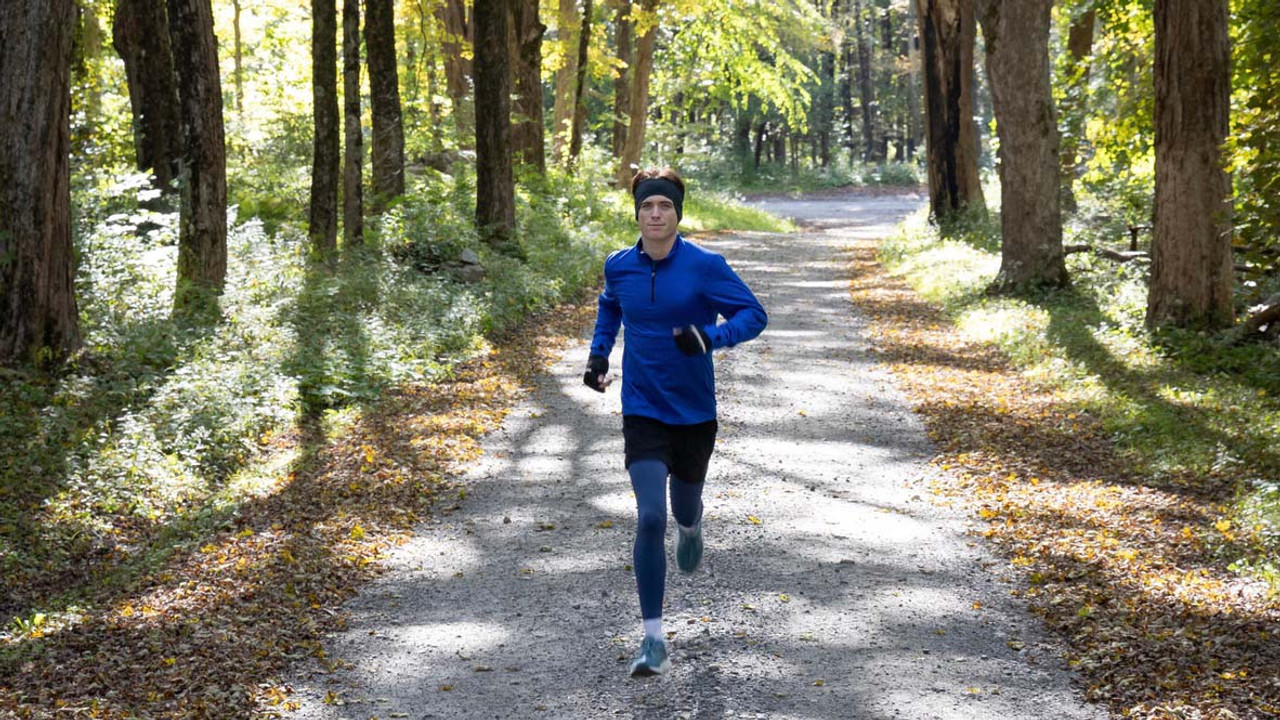Food is fuel: run better on the trails with these fueling tips.
Trail running burns a lot of energy, even more so than road running. The challenges of navigating uneven terrain, hills, and more require more from your body. Just like getting dressed in the right gear, nailing your pre-run fueling strategy takes some trial and error to figure out what works best (for your schedule and stomach). So, you may be wondering what you should eat before a run to keep your energy high and avoid the dreaded bonk while you’re out on the trails.
Fueling up for trail running isn’t a one-size-fits-all approach. Everyone has different dietary needs and restrictions, so when in doubt, have a conversation with your doctor. However, to get you started, here are some tips for what to eat before a trail run.
Should You Eat Before Running?
It’s always a good idea to fit in a snack or a light meal before a run. While you may be a runner who likes to hit the trail on an empty stomach, consuming carbohydrates a half hour or so beforehand can keep you from becoming light-headed and will improve both your performance and enjoyment of the run.
Easy pre-run snacks include carbohydrates like dried fruit, nuts, an energy bar, or a shake made with protein powder. They’ll provide the stamina to work out longer. Before a workout, trail runners will do best with specific foods that are high-carb, medium in the protein department, and low in fats and fiber. If dairy tends to do a number on your digestive system, opt for substitutes like almond or soy milk in your pre-run shake. On that same note, avoid eating high-fiber foods before a run.
The particular challenges of trail running require more energy: the terrain is uneven and your pace is slower. A trail runner will benefit from eating more carbohydrates before a run. If you haven’t eaten in a few hours, there are so many easy carb snacks you can eat 30-40 minutes before lacing up your sneakers: make time to fit in this essential performance element.
Understand Nutrition Basics
The nutrition basics for trail runners boil down to a few essentials. While everybody is different, a good rule of thumb is to eat between 120 and 200 grams of carbohydrates each day. Healthy fats, like avocado, fatty fish (salmon, sardines), and olive oil are another source of energy. Plus, they’re anti-inflammatory. Protein is the third leg of this trifecta, helping with muscle repair. Your needs may differ between a regular run and training runs for longer events; 1.6-1.8 grams of protein per gram of body weight per day is a good average. As an example, a 140-lb person would do well with anywhere between 102 and 114 grams of protein each day.
Carbohydrates
Carbohydrates are essential for generating energy. Eat them about 30-45 minutes before a run. During your run, taking in about 100 calories of carbs at regular intervals of 20 to 30 minutes will keep you on pace. Single-serve gel packs are an easy way to keep up your energy.
Fats
For trail running nutrition, healthy fats play a key role. Carbs are the main source of energy, but your body will also tap its stored fat to keep you going during longer runs. About 20-35% of your daily calories should come from fats like avocado, fatty fish, olive oil, seeds, and nuts.
Proteins
Trail runners need more protein than the average person, somewhere between 1.4 and 2.0 grams per day per kilogram of weight. Protein helps rebuild the muscle that breaks down during a run, especially those longer, harder ones. Choose poultry, fish, eggs, beans, and dairy products on a regular basis.
Tips for what to eat before a trail run
Fueling before a trail run doesn’t have to be difficult, especially for shorter distances. Everyone’s sports nutrition needs are different, but you might opt for a light meal about 30 to 40 minutes beforehand, such as a protein shake (made with almond or soy milk if you don’t do well with regular dairy). If that seems too much, grab a banana or handful of nuts (almonds are excellent). Dried fruit is another good choice.
While some trail runners like heading out on an empty stomach, a little bit of proper fuel beforehand results in a better workout and prevents you from becoming light-headed partway through. Trail running is more challenging than road running due to navigating uneven terrain and running at a slower pace; your body needs the right fuel to perform at its peak. With so many quick options, from cheese to nuts to shakes or on-the-go carb-based gel packs, there’s no reason to skip fueling up.
A light meal
Having a small meal a little heavier on the carbohydrates is a great way to boost your energy levels for your run. The goal is to eat something that is light and easy to digest. Some good breakfasts before a trail run include:
- Toast with peanut butter, banana slices and honey
- Fruit smoothie with Greek yogurt
- Oatmeal with fruit, nuts and a drizzle of honey
- A bagel with nut butter or Nutella
- A granola bar and a piece of fruit
Aiming to eat one to four hours before your run should be plenty of time to digest beforehand.
Coffee
Coffee is okay to have before a run. Some people drink it for the potential performance benefits caffeine offers, but others use it to jumpstart digestion.
If you’re worried about feeling full or find yourself wishing for a bathroom early in your run, consider drinking a cup of coffee and running a “poop loop” near home. This is an easy neighborhood loop that helps get digestion going, allowing you to take care of business at home and get on with the rest of your run in comfort.
Fasted cardio
Some people who run first-thing in the morning will skip breakfast in favor of running fasted. It’s also possible for those who do intermittent fasting and run later in the day to do fasted cardio. The idea is that instead of running on glycogen stores, the body is burning fat for fuel and this can result in weight loss. Fasted cardio isn’t ideal for everyone, so have a conversation with your doctor if you’d like to give it a try.
Fueling for a hard effort
What you need nutritionally for your daily trail run is different than what you need from a pre-race meal. A hard-effort run requires endurance, which comes from both the right balance of foods and the timing of when you eat them.
Carbs provide energy. The longer the run, the more you’ll need. Eat 50-90 grams of certain foods that are easily digestible like bananas, oatmeal, or whole-grain pasta or bread. Add a little protein (some yogurt, cheese, or nuts) to keep hunger at bay. Give yourself 2-4 hours to digest a pre-race meal, and 30-40 minutes for a snack. And don’t overdo it: your stomach can only efficiently digest and absorb so much at one time.
Hydration is critical, so be sure you’re drinking plenty of water the night before and during the run. You may also need an electrolyte beverage, especially if you’re running in hot weather. You’re going to need a regular intake of carbs on the run, about 100 calories every 20 to 30 minutes. This is where those little nutritional gel packs come in handy.
After the race, take in some protein and fats to help in muscle recovery and ease inflammation.
Carb loading
You might have heard of runners talking about “carb loading,” which is eating a carbohydrate-heavy meal to beef up glycogen stores. Glycogen is a fuel source burned during a run. However, eating a lot of carbs, especially if they are high in fiber, can cause bloating and intestinal distress.
If you’re carb loading throughout the week before a hard effort or trail race, slightly increase your carbohydrate intake at each meal with a focus on high-quality, low-fiber carbs like potatoes, rice, bread, pasta, fruit and some vegetables.
Dinner the night before
The night before the effort, it’s best to eat a balanced meal with ingredients that are easy to digest. This includes your carbs, plus a serving of protein and healthy fat. Here are some examples:
- Steak, baked potato with organic butter and grilled zucchini
- Grilled chicken, sweet potato and asparagus drizzled with olive oil
- Salmon, rice, pico de gallo and avocado
- Stir fry with eggs and low-fiber veggies
- Pizza (but not too much!)
You might even enjoy a non-alcoholic beer from Athletic Brewing with dinner. Finishing your meal with dessert is a nice treat. If you’ve been avoiding refined sugars and grains during training, know that they’re quick to digest and can be easier on the stomach than high-fiber grains and veggies.
Fueling the morning of
A hard effort or race day can have a slightly different schedule than a regular training run, so it’s important to adjust for this change. For example, you might find yourself traveling a bit further for your long run or a race, and the gap between breakfast and starting your run can be much longer.
If you find yourself needing a little extra something immediately before your run, here are some good options that are easy to pack:
- Banana with nut butter
- Protein shake
- Peanut-butter-filled pretzels
Don’t forget to get ahead of your hydration. Including a sports drink or electrolyte mix will help keep your muscles hydrated and performing their best.
Fueling during your run
Fueling during long trail runs is important, too. Many runners use gels or chews to keep energy up, whereas others seek out solid foods or other fuel options. We love 2Betties and Endurance Tap for fuel on the trails. Testing out fueling options during shorter runs will help you know how your energy levels and stomach do. Check out this guide for carbs and endurance training to learn more about timing and how many carbs to consume.
Check out our blog for more tips to help you take the trail less traveled.

